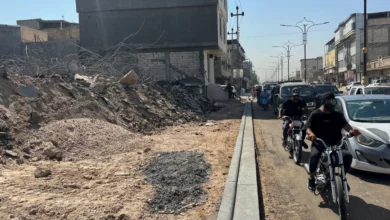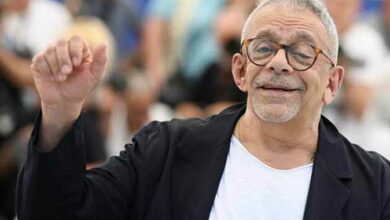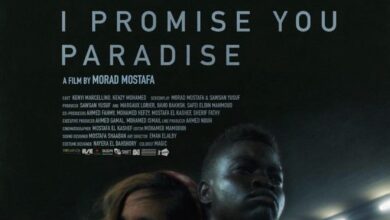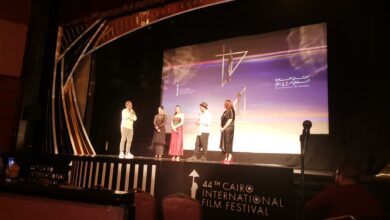The trailer for Basra, an independent movie screened at the 2008 Cairo International Film Festival and showing at cinemas this Eid, is equally captivating and confusing.
The protagonist, photographer Tareq (played by Bassem Samra) stares thoughtfully at the sunset while checking his camera. This image suddenly cuts to a scene from the Iraqi war. Nahla (Yara Goubran) suddenly appears to say, “Did you see how he looked at me like I’m a prostitute?” Then Hamada (played by Iyad Nassar) appears joking about hash and drugs. Tareq and Nahla are having sex. That scene is interrupted by a zooming out over a small crowd of people in a demonstration carrying indecipherable signs. Somebody dies, and Tarek attends the funeral. We are then abruptly taken to a location by the Pyramids, where someone is dancing salsa. Half-naked girls are seen
wearing war outfits, and then (with appropriate dramatic music) we see the fall of Sadam Hussain’s statue in Baghdad back in 2003.
Do not worry if you cannot follow the movie’s plot. You are not alone.
The title, Basra, plays on the name of the second largest city in Iraq and also the famous cards game in which two players end up with the same card.
Taking place in 2003, Tarek and his best friend Hamada, who works as a creative director at an advertising agency and is famous for his "controversial" work, meet up on a daily basis to smoke hash and talk about their disappointments in life. Existential questions about life, death, sex and logic recur as the two watch news reports about the Iraq war on television while under the influence of drugs. Tarek meets Nahla and they engage in equally futile discussions. Tarek spends his days collecting wine corks and searching for condoms while Nahla is preoccupied with finding her philosophical identity.
The two lovers collapse with the fall of the Iraqi lands under the US-UK strike. And their suffering is symbolized by gloomy skies and dark backgrounds.
Viewers are left with multiple questions as they leave the movie theater, particularly concerning the logic behind connecting these people to the Iraqi war, the message the scriptwriter and director Ahmed Rashwan wished to deliver to his audience, and finally, who the target audience of this movie actually is.
The director might have wanted to show the effect of the Iraqi war on a certain class of Egyptians and how they reacted to changes in the world around them. He sought to bring the viewer closer to the secret world of these people, who challenge social norms yet connect with society on different levels. It seems Rashwan hoped that the
audience would leave the movie theater with an open-mind, sympathizing with the characters.
If this is so, he was not successful. At times the movie seems to condemn the characters’ liberal lifestyles and limited views of life, while at others it celebrates them. That is not the only unbalanced theme in the film. The Iraqi war storyline sometimes disappears from the plot, allowing the personal lives of the main characters to take over,
then, out of the blue, it comes back to remind the audience of the larger context within which these events are occurring. The shifts tend to be too abrupt however, and add to the audience’s confusion.
Perhaps the most successful element in Basra is the smart drawing of scenes and camera angles by first time director, Rashwan. The director also gives room to his actors to experiment as reflected in the solid acting by the two main characters Tarek and Nahla. Iyad Nassar’s character Hamada is, however, easily forgotten as it was written in a shallow and unoriginal style.
Basra received a number of awards, including Best Screenplay in the Arabic Film Competition at the 2008 Cairo International Film Festival. The film poses a dilemma as you try to figure out where to place it, and maybe it’s better to allow this film to fall, just like its own characters, in the uncertain realms of inbetweeness.




